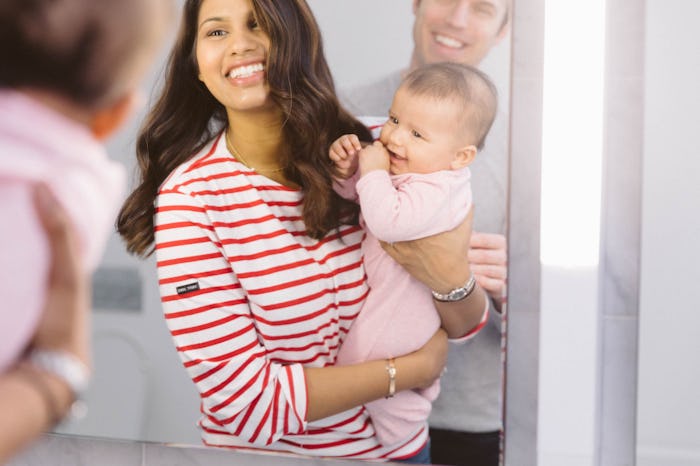Life
These Physical Signs You're Bonding With Your Baby Are Literally Too Cute
"Love at first sight." That's how many mothers and fathers explain the immediate bond they felt when they first laid eyes on their babies. That's because the parental connection is no joke, especially the one that happens over the course of the nine months a mother carries a baby in her womb. But once their baby is actually in their arms, many mothers begin to wonder how they will bond with their babies. Does it just happen naturally? And what are some physical signs you're bonding with your baby? Because you would kind of like to know if they like you or not.
First and foremost, experts say, you need to relax. Bonding with your baby is not nearly as mysterious as you might think. "Simply enjoying your baby is what helps you bond with her — and her with you," child psychologist Penelope Leach told Baby Center. "Babies fall in love with the people who enjoy them, and who help them enjoy themselves."
According to Leach, by the time your little one is about 3 months old, they will save their brightest smiles "for the people she knows best" and will become increasingly sociable, as well as noticeably more fussy about people they're not so keen on hanging out with.
Of course, part of that might have to do with the fact that your little one knows how to sniff out her mommy's scent. According to a study that monitored the attractiveness of breast odors to babies, little ones unequivocally sniffed out their mama's scent when placed between two gauze pads, one with their mother's breast milk and the other with the smell of another woman.
But, naturally, it's more than just that. Parenting noted that from the moment a baby is born they can recognize their mother's face, voice, and smell. They will eventually link these sounds and smells with loving feelings, which is why you will often catch your baby staring at you — they're just trying to memorize everything there is to know about their mama.
In addition to smiling, turning toward you, and lovingly gazing upon your presence, babies will also show you they care by "checking in" with you, The Bump noted. You'll notice this behavior once your little one begins to crawl. While they will be happy to explore, you will also find they frequently return to your side to make sure you are still there in case they need you.
That kind of reassurance will also become apparent when you pass your baby off to someone else and they reach for you, or they begin walking and you find them standing at your feet with outstretched arms. According to What To Expect, your baby will begin reaching for familiar objects and people by the time they are about 5 months old. That includes everything from their favorite toy to mommy and daddy.
As your baby crosses over in to toddlerhood, you'll find they can be a bit more expressive with how they tell you they love you. Toddlers will challenge you to chase them or ask you to dwell a bit longer in various activities so that they can score extra time with you, according to Parents. A toddler who likes to carry a lovey is also showing you that they like to keep something close that makes them feel safe, a feeling they associate with their parents, the magazine noted.
And if that's the case, then my 2-year-old daughter loves the sh*t out of me because her lovey — a soft, white kitten aptly named "Kitty" — goes everywhere with us. Thanks, babe. Mama loves you, too.
Check out Romper's new video series, Bearing The Motherload, where disagreeing parents from different sides of an issue sit down with a mediator and talk about how to support (and not judge) each other’s parenting perspectives. New episodes air Mondays on Facebook.
